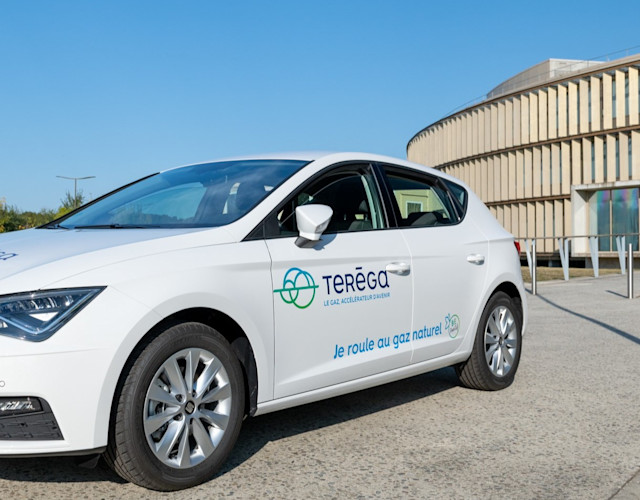Gas emergency 0 800 028 800

BE POSITIF: Teréga’s environmental programme
As a responsible actor in the energy sector, we are aware of the challenges of environmental and energy transition. Within the regions, our actions and contributions must match expectations in respect of environmental impact. The BE POSITIVE programme (from the French for “Positive Environmental Balance Sheet”) is part of that approach.
A culture of environmental responsibility at Teréga
Since 2017, the BE POSITIF programme, led by Teréga’s Corporate Social Responsibility and Environmental (CSR) department, pursues this objective: progressively to eliminate the environmental footprint left by our activities, achieving a neutral environmental impact in 2020 and generating value by 2025.
![[object Object]](http://images.ctfassets.net/ztehsn2qe34u/1dMWiC9RdCvC95tMT95Seq/2a24c4177b6445051c55d25baea9a9bd/logo-be-positif.png)
The programme is an integral part of our IMPACTS 2025 corporate plan. It should help us contribute to achieving the national targets set in the COP 21 Paris Agreement through a methodological approach to impacts which can be summed up in three key words: “Avoid – Reduce – Compensate”.
The ambitious BE POSITIF programme provides the environmental pillar of our CSR process. Indeed, to be a responsible energy actor, we must demonstrate our capacity to make ongoing changes to energy management, which should be renewable and virtuous, appropriate to current climate challenges, and with a view to sustainable energy transition. Thus, approximately ten years on, we are developing an increasingly exhaustive carbon audit approach to monitor our performance and gauge the effectiveness of our actions. Thanks to that strategy, our carbon footprint has been diminishing since 2012.
At Teréga, environmental responsibility is everyone’s business
Since its launch, it has been our desire to involve all workers at all levels of the company in this environmental programme. That cultural shift can now be seen every day, because BE POSITIF must be and must remain a collaborative approach that runs through the whole company.
![[object Object]](http://images.ctfassets.net/ztehsn2qe34u/1HOLVfT22dKp2svOfro2L8/f1262297f81217a31b4ff876f2b41e49/velo-terega-lussagnet-be-positif-mobilite.jpg)
Actions have been taken to strengthen that “new” culture and ensure we continue to aim high:
energy performance targets included in and rolled out via an integrated management system (ISO 14001, 9001, 50001);
an approach supported by all the management including BE POSITIF:
BE POSITIF awareness-raising sessions conducted among all employees in the different areas;
a two-way dialogue established with teams to devise actions together;
dedicated workshops, included into our conference programmes.
Actions concerning environmental challenges are developed to enhance that internal “conviction”:
a digital efficiency process (reduced printouts, fewer devices, extended user life, serverless approach etc.) ;
a new approach to the maintenance of green spaces, with a zero plant treatment product objective;
extra weight given to environmental considerations in invitations to tender;
a fleet of NGV vehicles to fit the programme’s aims, etc.

Laëtitia MahencHead of the Enviromental and Corporate Responsibility DepartmentOur ambition is to set an example. We therefore owe it to ourselves to be proactive. To avoid our greenhouse gas emissions, to reduce our carbon footprint, and to compensate for our overall impact on the environment.
BE POSITIF: results at Teréga today…
Emissions of greenhouse gases (GHGs) and our impact on biodiversity are the major repercussions of our natural gas transport and storage activities. The BE POSITIF programme, based on the “Avoid-Reduce-Compensate” methodology reaches its first milestone in 2020: carbon neutrality. It has been achieved by practical action:
renewal of our compression equipment, with a move to electric compressors;
a recompression truck – unique to Teréga – to avoid the release of methane into the atmosphere during engineering works (between 10% and 15% recovered);
![[object Object]](http://images.ctfassets.net/ztehsn2qe34u/86y9WqNVQN9hQD6ZZPFaA/921c44972cb9e39cec7d9fe42a109de7/camion-recompression-gaz-terega.jpg)
the burning-off of methane using a flare, which helps reduce the impact of emissions, used when recompression is impossible. In our ARC approach, releases into the air are limited to what is necessary for safe working; when they cannot be avoided by consumption they are reduced by recompression or burning off;
the deployment of NGV in our vehicle fleet, for a reduction in particulate emissions (-20 to -30% CO2, and lower NOx and SOx content);
switching our energy sources over to renewable energy. All the electricity consumed at Teréga, whether in our buildings or on our industrial sites, is 100% renewable;
electrical self-sufficiency to supply our sites.
… how is Teréga preparing for tomorrow’s world with BE POSITIF?
These positive outcomes are not an end in themselves, because at Teréga we are all committed to a process of continuous improvement. To take things to the next level, environmental actions are already planned for 2024/2025 on issues such as reducing methane emissions and fugitive emissions, NGV, self-sufficiency, and alternative solutions to plant treatment products for maintaining our industrial sites.

How does compensation work at Teréga?
Our environmental performance is improving every year, but little by little we shall reach a point where the carbon emissions connected with our activities cannot be cut down any further. With BE POSITIF, our commitment is to offset them by, for example:
participating in the development of national carbon offsetting programmes;
participating in international carbon offsetting projects through the Clean Water programme. A project between Ethiopia and Eritrea to develop clean drinking water supplies for the people, without any impact on the environment. An action which was selected by our employees in an internal vote.








